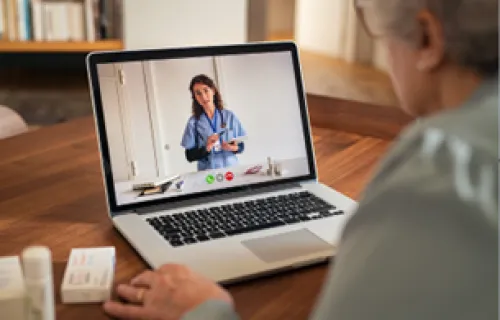It’s no secret that the NHS is facing unprecedented challenges. From financial constraints and sustainability management, to workforce shortages and capacity issues, the need for our 75 year old institution to modernise and address mounting pressures has never been more urgent.
This is especially necessary in the context of our rapidly changing world, where digital transformation is successfully reshaping industries across the board. With everything from retail to banking transitioning to digital environments that vastly improve user experiences, it’s time to look to the digital future of health and care.
I’m not suggesting that all services should be digitised, but there are undoubtedly aspects such as primary care, outpatient services, and hospital access that can benefit from innovative technologies. This is highlighted by the accelerated implementation of digital solutions such as remote consultations and care management to support citizens through the impact of COVID-19.
Just imagine having access to a self-service portal or mobile app that is backed by proven, technical support, empowering users – both staff and citizens - with better experiences:
All your healthcare data is in one place, so you and (with your permission) your circle of care can simply and quickly access the latest information to feel confident in the health and care support you’re receiving.
This data helps staff make well-informed and timely decisions to deliver your care more effectively, as they’re empowered by efficient processes that reduce duplication, effort and pressure across their workload.
Simultaneously, health and care organisations are better equipped to deliver equitable services to all citizens based upon real need, reducing unwarranted variation, improving health inequalities and even benefitting the wider economy.
Putting people first
The current state of the sector is characterised by daily firefighting and relentless pressure. This unsustainable approach fails to meet the needs of both citizens who deserve the best quality healthcare support, and staff who work tirelessly to deliver it.
Therefore, digital transformation across the whole system must start with a focus on people – citizens, patients, their circles of care, and the workforce – if it is to create successful, impactful change. That’s because simply adding new technologies to old models of care will only reinforce the sense that nothing has really changed.
Instead, we should combine information from our data-rich organisations with the insights of those who use the health and care system day in, day out, to completely reimagine care pathways and support processes. This human-centred approach to organisational change means engaging with citizens and staff to understand the pain points and challenges they face when engaging with existing processes and delivery models, to identify the real need for change. Only then can we begin to consider the technical solutions required to truly transform health and care experiences.
This whole system review must also consider the culture of individual organisations, including their specific:
- Integrated ‘fit’
- Readiness for change
- People’s needs – both staff and citizens
- Health outcomes and inequalities
- Processes and technologies
- Financial sustainability
The key components for change
With decades of traditional ways of working embedded into the NHS, and multiple attempts at structural reform having already failed to create radical change, how do we begin to create a more people-focused system?
1. Systems thinking
Consider “what good looks like” across the traditional boundaries of health, social care and the third sector, to create holistic experiences with access to services that meet staff and citizen needs. As part of this, identify business case developments, conduct investment value case analysis, and review your existing project management office and associated governance.
2. Service design
Map current processes and envision the future states, guided by user research and insights from citizens and staff. This ensures that we deliver the change that people really want to see, creating truly transformed experiences of care pathways and support processes.
3. Organisational readiness
Preparing organisations for change by addressing structural design, infrastructure maturity, human mindset, behaviours and skills. This includes staff collaboration and buy-in to transformation programmes to ensure the required cultural and mindset shift for new models of health and care to succeed.
4. Technology
The innovative solutions required to transform experiences of NHS services already exist, but we must first understand the existing technical landscape, the inherent gaps, and the shift required to create an interoperable digital health and care delivery model. Transformation across areas including artificial intelligence, automation, cyber security, cloud, and infrastructure will help health and care organisations realise their full potential.
Our people, process, technology approach
As a trusted advisor to the health and care sector, we put people first. We prioritise human experiences when engaging with services, and work to understand people’s needs to create meaningful change. We empower health and care professionals with intelligent, sustainable and healthy ways of working, and the ability to provide citizens with convenient, efficient access to quality care and support.
Whilst ensuring those engaged with services are empowered by revolutionary digital health and care experiences, we simultaneously support organisations to make complex, cost-effective decisions behind the scenes.
If you want to learn more about our vision for the future of health and care, and how we can support organisational change and digital transformation in the NHS, read our brochure. Or please click here if you’d like an informal chat about our service offerings.







